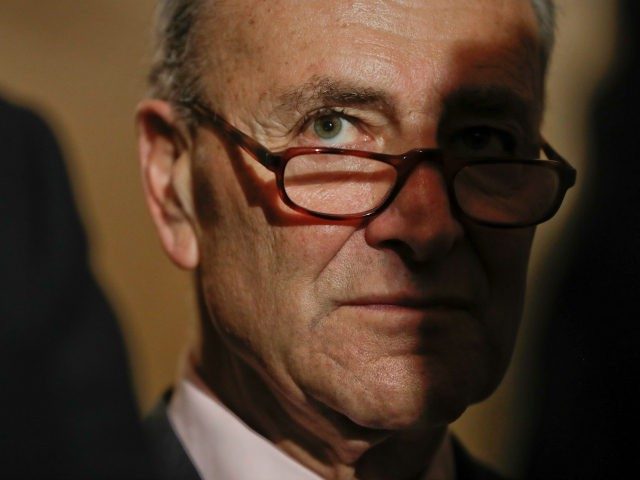Legislative Director Marc Short took the White House briefing podium on Friday to call out “historic obstruction” by Democrats for requiring 30 hours of debate over Trump administration nominees at a rate far beyond that which prior administrations faced.
Short repeatedly pointed to Democrat Senate Minority Leader Chuck Schumer for “…the historic obstruction that we have faced by Sen. [Chuck] Schumer and Senate Democrats in confirming our nominees to enable us to fill out our White House.”
“The Senate obviously has the constitutional responsibility for advice and consent,” said Short who then proceeded to describe “what that looks like in real life.”
After the President selects a nominee, that person goes through an FBI background check, “they work with the office of government ethics to deconflict financial issues,” and after this extensive process the nominee is submitted to the U.S. Senate.
There the individual goes through “several additional evaluations” including meetings with members and staff from both sides of the aisle. The nominee is then submitted to a committee hearing and vote, after which the nominee is submitted for a confirmation vote on the Senate floor.
“Traditionally the Senate routinely confirms an administration’s nominees once out of committee,” said Short. “What Sen. Schumer has done, is to require cloture votes to essentially slow down the process and to obstruct.”
Short then recounted the pace and history of Senate confirmations and cloture or “filibuster” of them under the four previous administrations. In the first 14 months of the Trump administration, the Senate had 79 cloture votes on Trump administration nominees.
He contrasted the 79 cloture votes under Trump to a combined 17 cloture votes in the same time period under all of the four prior administrations, or five times as many. Under President George H.W. Bush’s entire four-year term “he faced one cloture vote,” said Short. In four years President Bill Clinton faced just ten total cloture votes. In his entire first term, President George W. Bush faced four cloture votes. President Barack Obama endured 17 total cloture votes in his first four-year term in office. That’s a total of 32 combined over the entire first terms of the prior four presidents.
“Sen. Schumer is essentially weaponizing a Senate procedure in demanding cloture votes on our nominees that he even eventually supports,” Short emphasized. “Eleven of the President’s nominees have been confirmed without a single dissenting vote, yet still forced to go through 30 hours of debate to essentially slow down the Senate calendar, simply for the purpose of obstruction.” Short pointed to some Senate Democrats who have called out the obstruction as “ridiculous,” though he did not name which ones he was referring to.
“At this rate, the United States Senate would take eleven and a half years to confirm our nominees,” explained Short.
Short went on to list several nominees who have been waiting for confirmation for substantial periods of time, as of Friday: Deputy Secretary of Labor nominee Patrick Pizzella (nominated 269 days prior), Deputy Administrator of the Environmental Protection Agency nominee Andrew Wheeler (nominated 152 days prior), Assistant Secretary of State for Arms Control nominee Yleem Poblete (nominated 298 days prior), Treasury Department Assistant Secretary for Intelligence and Analysis nominee Isabel Patelunas (nominated 270 days prior), and U.S. Customs and Border Protection Commissioner nominee Kevin McAleenan (nominated 298 days prior).
Pizzella moved out of committee last October and had been confirmed for a position in the George W. Bush administration “by unanimous voice vote.” Wheeler passed out of committee last November. Poblete was previously staff director for the Foreign Affairs Committee. Patelunas was passed out of committee last July. McAleenan just got through a cloture vote last week and is expected to be confirmed this coming Monday.
“This level of obstruction is beyond historic,” charged Short.
In July of 2017, Senate Majority Leader Mitch McConnell informed Senators that he would extend the legislative calendar for two weeks to push through efforts to repeal Obamacare, raise the debt limit, and confirm nominees. Politico reported McConnell’s words, putting the blame on Democrats for the delay.
Follow Michelle Moons on Twitter @MichelleDiana

COMMENTS
Please let us know if you're having issues with commenting.